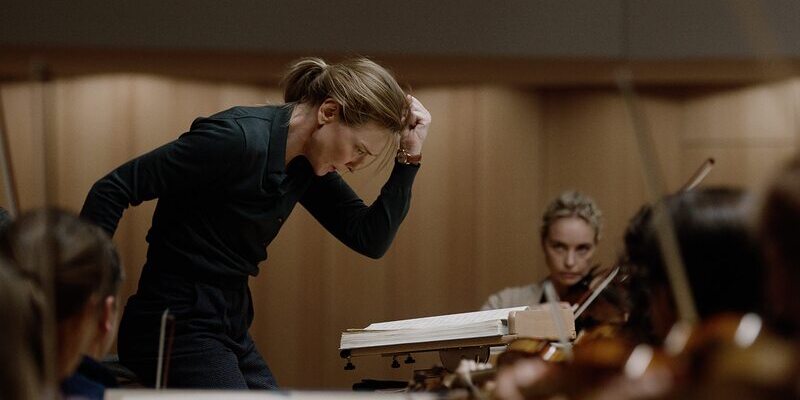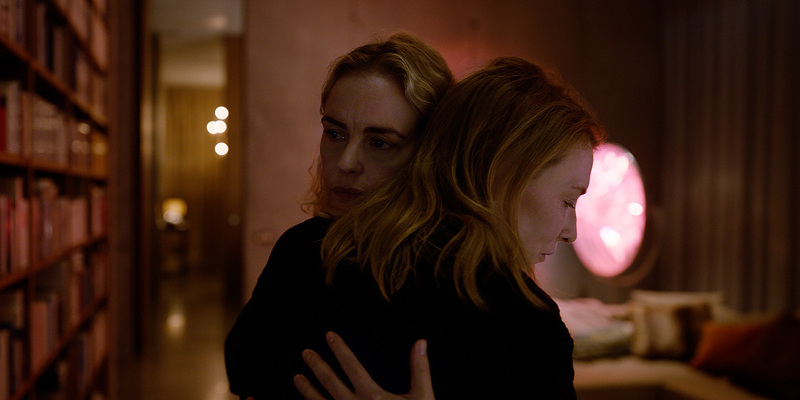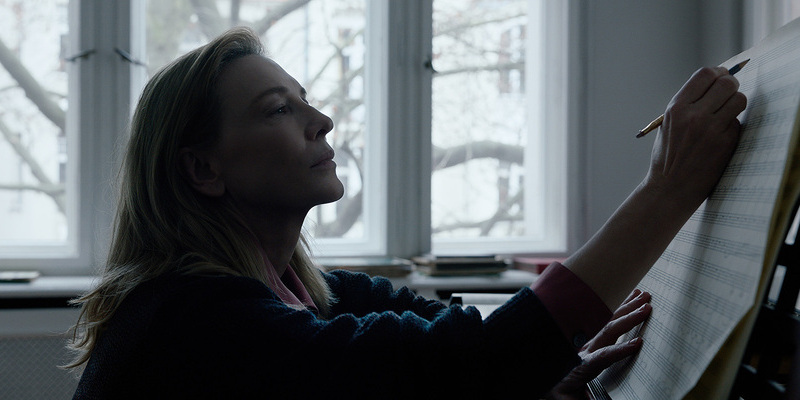
A renowned conductor prepares to record a career-defining symphony while
dealing with ghosts from her past.
Review by
Eric Hillis
Directed by: Todd Field
Starring: Cate Blanchett, Noémie Merlant, Nina Hoss, Sophie Kauer, Julian Glover, Allan Corduner,
Mark Strong

There's a certain irony to western society beginning to call out those who
exploit their positions of power just at the point when women are beginning
to attain such positions. If you're a predatory woman who fought hard to
acquire power in order to get laid, as so many men have over the years, you
must feel like a victim of a great injustice now. In writer/director
Todd Field's long-awaited third feature TÁR, Cate Blanchett plays such a woman. Lydia Tár is the world's most
respected female composer and conductor, her booming music having shattered
the glass ceiling. She's also not averse to using her position to exploit
younger women for sexual favours.

When one such victim, known as Krista, commits suicide, Tár finds herself
under scrutiny. Having been able to duck and weave her way out of such
issues in the past, Tár is stumped by how seriously allegations of
impropriety are now taken in the MeToo era. Standing stiff as a board with a
severe haircut that gives her the look of a portrait of some 15th century
Slavic dictator, Tár puts on a brave front, but inside she's crumbling,
haunted by ghosts of her past.
Indeed, TÁR is as much a psychological horror movie as it is
a character study. Tár's guilt over Krista's death begins to manifest itself
through strange occurrences. While jogging she hears a woman's screams yet
can't pinpoint where they might be coming from. At night she's woken by the
sound of a metronome hidden away in a closet. Other noises get on her
nerves, like the rattling of a car dashboard or a troubled neighbour
constantly banging on her door.

Things begin to take an eerie turn with the arrival of Olga (Sophie Kauer), a pretty young Russian cellist to whom Tár takes an immediate shine.
Olga arrives just at the point that Krista's suicide is revealed, and she's
initially filmed as though a ghost glimpsed wandering half seen through
rehearsal halls. If this were a more conventional movie you might assume
Olga was a friend of Krista who has arrived to seek some form of revenge, or
perhaps some sort of reincarnation, or maybe she's even Krista
herself.
But Field hasn't made a conventional movie. He's fashioned his film in a
manner that constantly trips up the viewer. Just when we think we've gotten
a handle on the movie and its fascinating anti-heroine, Field pulls the rug
out from under us. Few of the questions TÁR raises are
answered, making it a movie you'll be mulling over for days after viewing,
and no doubt rewarding successive viewings. Who is specifically out to get
Tár, recording her on a phone from angles that don't seem physically
possible? How did the working class Linda Tarr rise to prominence and become
Lydia Tár in the upper middle class world of classical music? Is a violent
confrontation with a rival conductor (Mark Strong) to be taken at
face value or as a product of Tár's unstable mind? Is there a deeper meaning to the use of Mahler's 5th beyond evoking Death in Venice, another movie about an aging homosexual pursuing younger prey? Looking for answers may
drive you as mad as the film's protagonist.

And what a protagonist Lydia Tár is. Blanchett's great strength has always
been in portraying women who seem to have it together on the outside while
falling apart emotionally, so it's no surprise that Field wrote the part
specifically for the Aussie star. There's something fascinating about
characters who are very good at what they do, but sometimes actors don't
fully convince in such roles. Watching Tár debate everyone from New Yorker
writers to "triggered" Julliard students over the merits of her art, we're
fully convinced that this is a woman at the top of her profession, that
regardless of how messy every other aspect of her life might be, once she's
on that podium she's a titan of her art. As a problematic character, Tár is
entertainingly awful, but awfully entertaining. It's rare to see women
portrayed as assholes - at least not in a realistic rather than cartoon
Disney witch way - in the manner of say, Jack Nicholson's cantankerous git
in As Good As It Gets, because there's a double standard that dismisses such men as "eccentrics"
while labelling their female equivalents as "Karens." While nobody should be
an asshole, everyone should have the right to be an asshole, regardless of
gender. Meet Lydia Tár, your new favourite asshole.

TÁR is on Netflix UK/ROI now.
